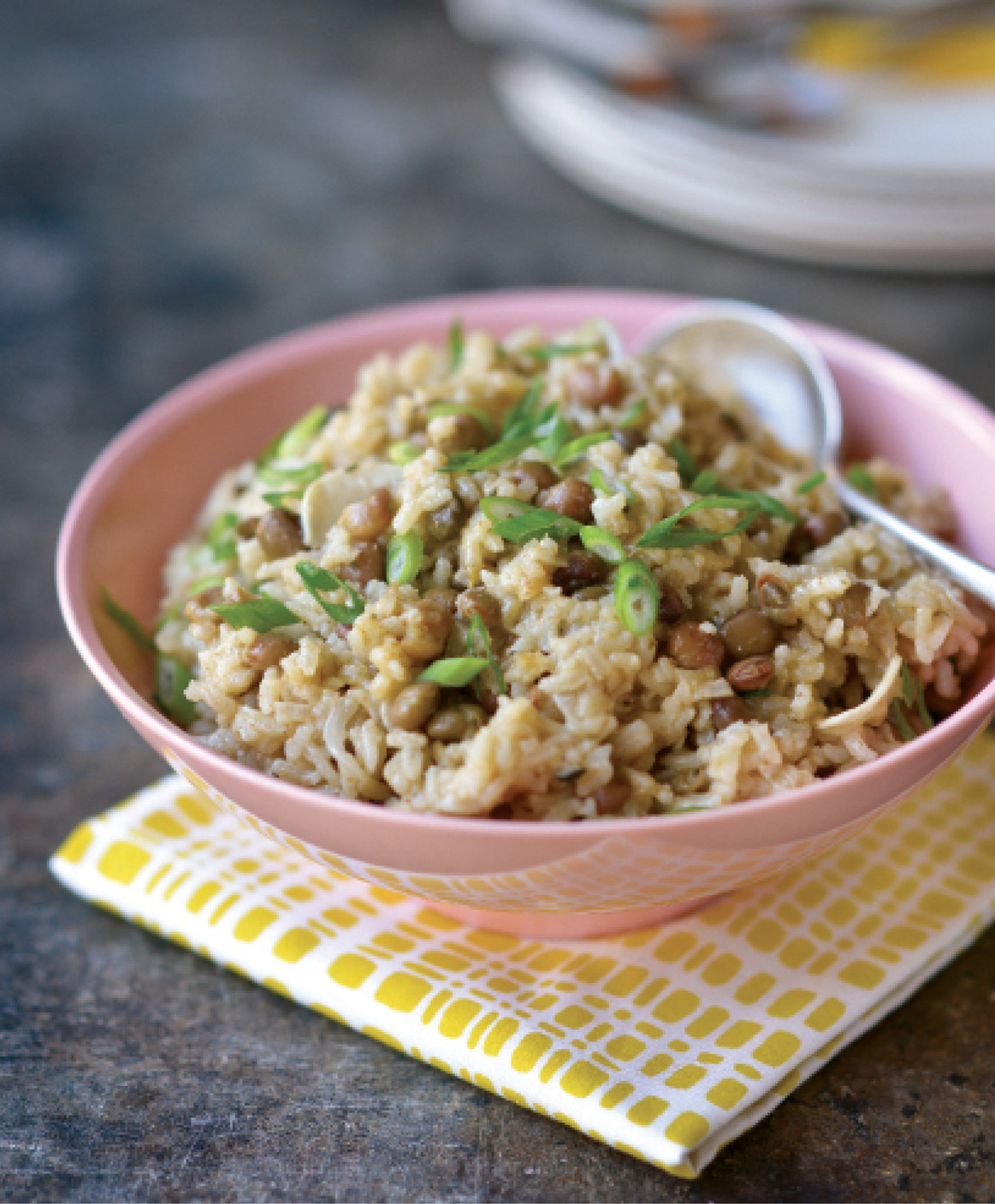
Pigeon Pea Rice
In the Caribbean, side dishes are quite varied. Common staples like rice, pasta, and potatoes are the norm, but we also make good use of local and traditional produce, which we call ground provisions—things like yams, breadfruit, and plantains. You can find most of the ground provisions in these recipes in ethnic markets. If you can’t find them locally, feel free to make substitutions. All of these side dishes are flavorful—so much so that some of them tend to upstage the main course!
This rice can be made with spinach, bok choy, or any green leafy vegetable that cooks up soft. In the Caribbean, we typically use either spinach or bok choy to make this dish. This goes well with Chickpea Curry.
SERVES 4
1 tablespoon olive oil
1 onion, chopped
1 cup (30 g) chopped fresh spinach
1½ cups (270 g) white basmati rice, rinsed
3 cups (720 ml) water
1 teaspoon pink or sea salt
Pumpkin Rice is simple yet stellar. With just five ingredients, this side dish is as praiseworthy as it is delicious.
SERVES 4
1 cup (180 g) white basmati rice, rinsed under running water and drained
1¾ cups (420 ml) water
¼ teaspoon table salt
2 tablespoons vegan margarine
1 cup (140 g) finely chopped calabaza squash or butternut squash
1 medium onion, cut in thin crescents
1½ teaspoons pink or sea salt

Many people associate Caribbean food with rice and peas, and they are right. This classic Caribbean rice dish is made with a variety of peas or beans and served as a side dish. On many islands, people tend to use pigeon peas, also known as gungo peas. Note that dried and canned pigeon peas have slightly different flavors.
SERVES 6
2 tablespoons olive oil
½ onion, sliced into crescents
1 cup (170 g) fresh, frozen, or canned pigeon peas
2 garlic cloves, sliced
1½ teaspoons Bajan Seasoning
Bouquet garni (see Island Tip) made with a few sprigs each of thyme and marjoram, and 2 green onions
Pinch of mild paprika
Pinch of black pepper
3½ cups (840 ml) water
1 cup (210 g) white short-grain rice, rinsed
1 Scotch bonnet or habanero pepper
1 teaspoon adobo seasoning
1 teaspoon onion powder
½ to 1 teaspoon pink or sea salt
2 garlic cloves, pressed
Chopped green onions, optional
ISLAND TIP
For the bouquet garni, there is no need to bundle it in cheesecloth as you may be accustomed to doing. This bouquet garni has a dual purpose of flavoring the rice and decorating it with flecks of thyme.
This rice dish is an excellent side dish, but it is even better with a partner in crime, such as Onion Gravy or Creole Sauce. The onion provides a nice sweet balance to the curry.
SERVES 4
2 tablespoons olive oil
1 tablespoon Madras curry powder
½ onion, minced
1 cup (180 g) white basmati rice, rinsed
2 cups (480 ml) water
1 teaspoon pink or sea salt
1 teaspoon ground turmeric
1 teaspoon onion powder
½ teaspoon adobo seasoning
⅛ teaspoon cayenne pepper, optional
ISLAND TIP
Feel free to add fresh or frozen sweet peas, for color contrast and nutritional value. Just stir them in when you add the rice.
This is a great workday dinner that is very easy to make and very flavorful. The spice blend is the heart of the dish and can be used for many other recipes. Tarragon perfumes the rice, while grated onion imparts a savory flavor.
SERVES 4
1 cassia stick
1 tablespoon black peppercorns
1½ teaspoons whole cloves
1 teaspoon caraway seeds
1 teaspoon cardamom seeds
¼ teaspoon ground mace
2 cups (390 g) hot brown rice, cooked according to package instructions
1 cup (185 g) hot cooked quinoa, cooked according to package instructions
1 onion, finely chopped
1 carrot, finely chopped
1 teaspoon pink or sea salt
1 tablespoon chopped fresh tarragon or thyme leaves
In the Caribbean, Creole rice usually means white basmati rice cooked with salt. It can also be a red-colored rice flavored with spices and a bit of peanut butter, as in this recipe. If your peanut butter is very thick, heat it in the microwave before adding it to the dish so it will mix in better. You can use dried Louisiana-style Creole seasoning in this recipe, as it is quite similar to the type used in the French West Indies. Sautéing the annatto seeds in the oil is an optional step, but it’s worth doing as it gives the rice a nice red color.
SERVES 4
1 teaspoon vegetable oil
¼ teaspoon annatto seeds, optional
1 onion, finely chopped
2 garlic cloves, pressed
1 carrot, finely chopped
½ celery stalk, minced
1 cup (180 g) white basmati rice, rinsed
2½ cups (600 ml) water
⅓ cup (80 ml) tomato sauce
1 tablespoon peanut butter
1 tablespoon Creole seasoning
1 tablespoon chopped fresh parsley
1 teaspoon chopped fresh thyme, or ¼ teaspoon dried
1 teaspoon pink or sea salt
1 teaspoon tomato paste
1 Scotch bonnet pepper
ISLAND TIP
In this recipe, the hot pepper is used for flavor, not heat. The flavor from the Scotch bonnet is really good and this method of cooking with an entire pepper extracts flavor without so much heat. Just be sure to pay attention when fluffing the rice, as the prongs of the fork can rupture the pepper!
I first was introduced to this dish in my food and nutrition class at secondary school. It was the one rice dish most of the girls in that class actually made at home. I was a bit dubious about its authenticity because the Spanish rice my father made when I was a child was red with tomatoes and made with pieces of meat. When I went vegan, I thought I had to give up this dish, because the original version relied heavily on New Zealand cheddar cheese, but trusty tofu and herbs and spices did the trick. Because it includes tofu, it’s a balanced meal on its own. For even more protein, serve it alongside a bean stew.
SERVES 4
2½ cups (600 ml) water
1 cup (180 g) white basmati rice
2 tablespoons plus 1 teaspoon vegan margarine
1 medium-large onion, chopped
½ green bell pepper, minced
2 tomatoes, chopped or thinly sliced
1 tablespoon Madras curry powder
7 ounces (200 g) medium or firm tofu
2 tablespoons unsweetened nondairy milk
1 teaspoon pink or sea salt
½ teaspoon ground turmeric
½ teaspoon cornstarch
2 tablespoons ketchup
2 tablespoons chopped fresh parsley
1 teaspoon American-style prepared mustard
Pink or sea salt
Black pepper
3 tablespoons fine bread crumbs
Coconut rice is a real crowd-pleaser. This rice dish is bold and colorful from the herbs and spices, and the coconut milk almost gives it a buttery flavor that will keep your guests going back for more. This method of cooking the rice in coconut milk, called an “oil down,” is similar to the method for Vegan Grenadian Oil Down. For an Ital meal, leave out the salt and pair this rice with Mixed Bean Stew.
SERVES 4
1 tablespoon coconut oil or canola oil
1 onion, minced
3 green onions, minced
6 garlic cloves, 4 whole and 2 pressed
1 celery stalk, finely chopped
2 tablespoons chopped fresh parsley
1 tablespoon chopped fresh thyme, or ¾ teaspoon dried
2¼ cups (540 ml) coconut milk
1½ cups (270 g) white basmati rice
¼ cup (20 g) minced mild chile peppers, such as Hungarian wax peppers
1 to 2 tablespoons minced mixed herbs (such as marjoram, thyme, or basil), green onions, or a combination
1½ teaspoons pink or sea salt
1 teaspoon black pepper
½ teaspoon mild paprika
¼ teaspoon ground turmeric
¼ teaspoon ground allspice
If you need a quick and easy dish after work or school, this one-pot meal of spaghetti cooked in Caribbean-style sauce may fit the bill. There is no fixed recipe for making Creole spaghetti; the ingredients vary from island to island. In Saint Martin in the French West Indies, open-air food establishments sell Creole spaghetti. This recipe is similar to the version they make.
SERVES 4
7 ounces (200 g) spaghetti (see Island Tips)
½ cup (115 g) chopped chicken-style seitan or other meat substitute (see Island Tips)
1 tablespoon Bajan Seasoning or Trinidadian Green Seasoning
1½ teaspoons adobo seasoning
1 tablespoon canola oil
1 onion, minced
4 garlic cloves, pressed
1 red bell pepper, chopped
1 green bell pepper, chopped
1 tablespoon minced mild chile peppers, such as Hungarian wax peppers, optional
1½ cups (360 ml) water
¼ cup (60 ml) ketchup (see Island Tips)
2 tablespoons vegan Worcestershire sauce
2 teaspoons Angostura bitters, optional
1 teaspoon onion powder
½ teaspoon white pepper
2 teaspoons chopped fresh parsley
Pink or sea salt
Black pepper
ISLAND TIPS
I recommend using whole wheat or multigrain spaghetti.
In place of the seitan, you could use hydrated TVP chunks or cubes of a commercial meat substitute.
If you don’t want a sweet pasta sauce, use tomato sauce instead of ketchup in this dish.
Feel free to add any vegetable you like to this dish. Most vegetables can be added along with the onions. You may need to increase the cooking time a bit so that the vegetables are tender to your liking.
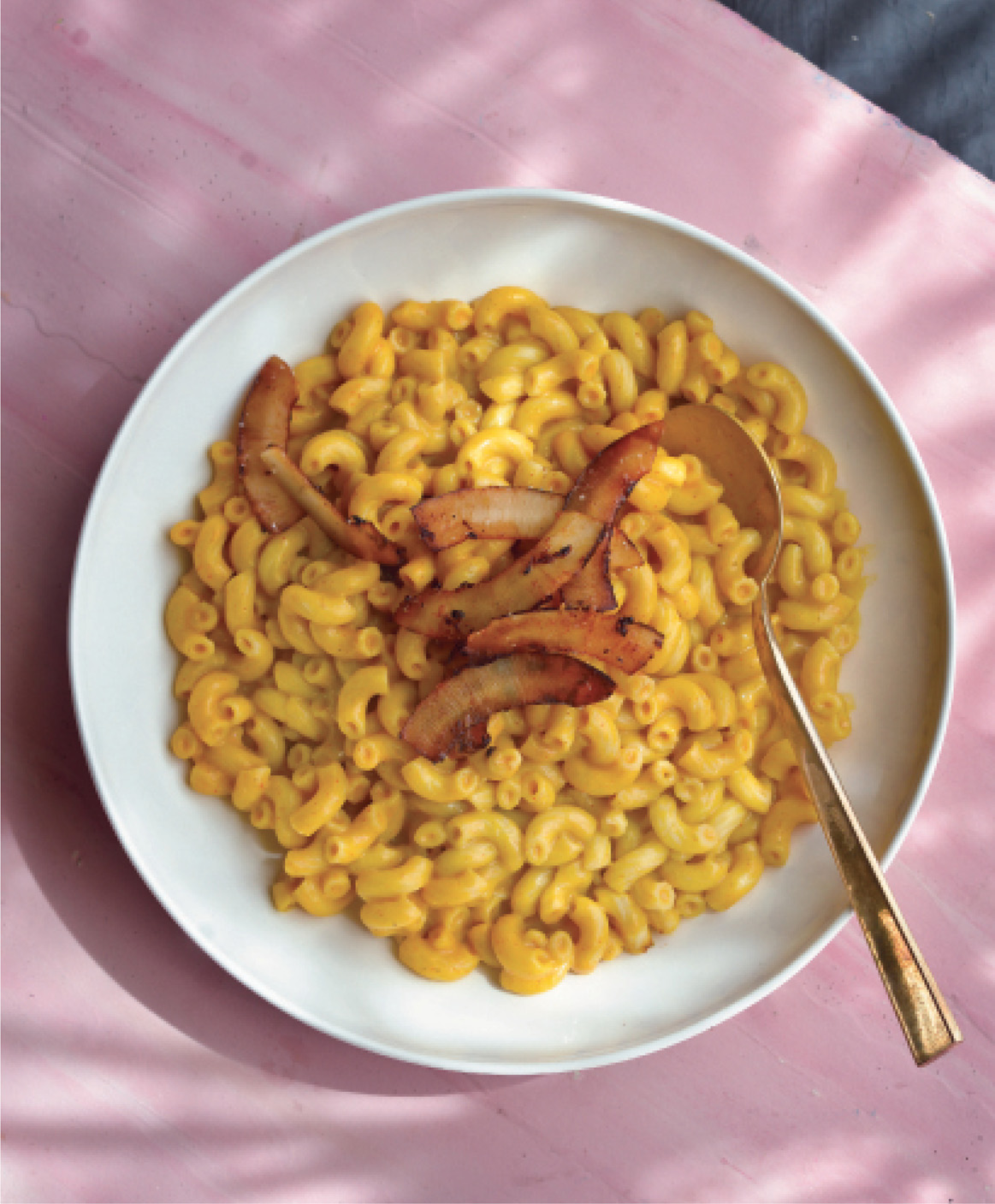
Shown with Coconut “Bacon”
This is a West Indian spin on one of the world’s most famous foods: mac and cheese. Mac and cheese is described as simple, comforting, and addictive. For me, mac and cheese is al dente pasta covered with a creamy cheese sauce. Calabaza squash, with its vibrant color and sweet taste, stands in for the cheese, and creamy coconut milk enhances the sauce. This dish can be baked if you prefer a mac and cheese casserole.
SERVES 4
2½ cups (350 g) chopped calabaza, butternut, or other winter squash
7 ounces (200 g) uncooked elbow macaroni
2 tablespoons vegan margarine
1 tablespoon unbleached all-purpose flour
1 cup (240 ml) coconut milk
1 teaspoon ground turmeric
¼ cup plus 1 tablespoon (20 g) nutritional yeast flakes
1 tablespoon American-style prepared mustard
1 tablespoon ketchup, optional
1 tablespoon onion powder
2 teaspoons pink or sea salt
1 teaspoon smoked paprika
1 teaspoon ground black pepper
1 teaspoon ground cumin
1 teaspoon sriracha sauce, optional
ISLAND TIPS
Top this with Coconut “Bacon” or crispy fried onions.
To make this into a casserole, place the mac and cheese into an 8-inch (20 cm) square baking dish and bake at 350°F (180°C) for 25 minutes.
After emancipation, many Chinese indentured servants in the Caribbean stayed on these islands. Many opened small village grocery shops, and often they made chow mein at home and sold it in their shops. West Indian cooks made the dish their own by using sauces with Caribbean flavors and, on some islands, using browning to color the sauce. This stir-fry does not taste like takeout, but like something extraordinary.
SERVES 4
2 tablespoons canola oil
½ onion, sliced into thin crescents
3 garlic cloves, minced
½ bell pepper, any color, cut into thin strips or diced small
15 to 20 green beans, chopped
1 medium carrot, diced small
1 cup (227 g) chopped chicken-style seitan, tofu, or faux chicken strips (see Island Tip)
2 tablespoons soy sauce, or more to taste
1 tablespoon Bajan Seasoning, Jamaican Jerk Seasoning, or Trinidadian Green Seasoning
1 teaspoon Caribbean Caramel or browning, optional
One 1-inch (2.5 cm) piece ginger, cut into thin strips
½ cup (120 ml) water
1 tablespoon tomato paste
1 teaspoon American-style prepared mustard
½ teaspoon black pepper
½ teaspoon white pepper
½ teaspoon Madras curry powder
¼ teaspoon mild paprika
7 ounces (200 g) egg-free chow mein noodles
1 cup (30 g) thinly shredded spinach
2 small garlic cloves, pressed
1 teaspoon Bajan Pepper Sauce or Asian hot chili sauce
Pink or sea salt, optional
ISLAND TIP
This can be made without any meat substitute. You can play around with adding peas or your favorite vegetables to make this dish even more unique.
Homemade pasta is well worth the time: 45 minutes of forming and hand rolling plus leaving it out to dry until the next day. Homemade pasta is not only for those who have time to spare but for anyone who wants to elevate this comfort food to a new level. There are three things you need: a bowl, a rolling pin, and a pizza cutter. You can cut the pasta dough into pappardelle, fettuccine, or linguine. Flaxseed, boiled and strained, stands in for the egg, and the optional tahini gives the pasta a more hearty depth. The pumpkin seed pesto complements this beautiful pasta, giving it a light, herby touch. The pasta can be cooked immediately after it has been cut, but I prefer to let it air dry overnight before using it. Fresh pasta cooks fast and absorbs sauce well. Note that you’ll need five clean hangers for hanging your pasta if you do not have a drying rack.
SERVES 8
2 tablespoons flaxseeds
1 cup (240 ml) plus 3 tablespoons water
½ medium sweet potato, baked and peeled
¼ cup (60 ml) olive oil
¼ cup (15 g) mixed fresh herbs (such as parsley, thyme, marjoram, and rosemary)
1 tablespoon tahini, optional
1 teaspoon pink or sea salt
3½ cups (440 g) unbleached all-purpose flour, plus up to 1½ cups (190 g) for rolling
½ cup (60 ml) olive oil
¼ cup (15 g) mixed fresh herbs (such as thyme, parsley, and marjoram)
3 tablespoons pumpkin seeds
½ teaspoon pink or sea salt
¼ teaspoon black pepper
This pesto will solidify in the fridge. Let it sit on the counter for about ½ hour before using, to loosen it up.
Homemade dried pasta must be stored in the refrigerator to keep it fresh because it is not as evenly dried as commercial dried pasta.
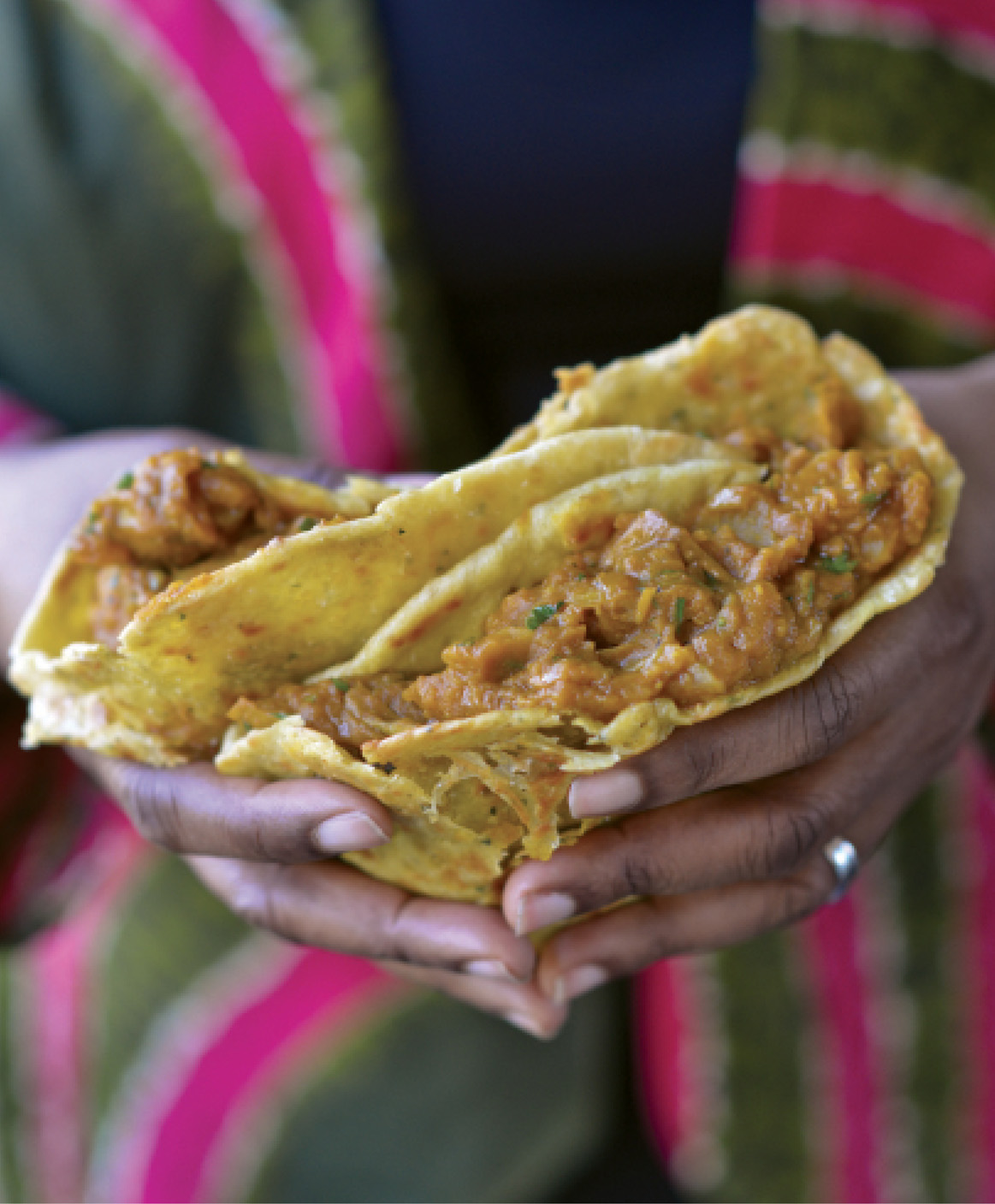
Shown with Curried Potatoes and Pumpkin
Roti is a type of Indian flat bread, but on some of the islands, roti refers to a dish of curry wrapped in roti bread. In this book, I use the term roti in both ways. This roti bread, or skin, as we call it, can be used to envelop Sautéed Okra, Sautéed Spinach, Curried Potatoes and Pumpkin, Chickpea Curry, Curried TVP Stew, and other curry dishes. Making filled roti may seem daunting, but once you’ve made them a few times you’ll get the hang of it. Be sure to follow the step-by-step photos. Do not worry about making them perfectly circular; I never aim for perfect circles. Just have fun with the process. I will say that making great roti skins takes patience; do not try to make this when you are in a hurry. If roti is something you like and you want to make it often, invest in a tawa or at least a crepe pan or cast-iron skillet.
MAKES 6 ROTIS
⅔ cup (130 g) dried yellow split peas, soaked overnight or quick-soaked (see Island Tip)
½ Scotch bonnet or habanero pepper, seeded and minced
2 tablespoons chopped fresh cilantro
4 garlic cloves, pressed
1 tablespoon ground cumin
¾ teaspoon pink or sea salt, or to taste
3½ cups (440 g) unbleached all-purpose flour
2 teaspoons baking powder
1½ teaspoons pink or sea salt
½ teaspoon ground turmeric, optional
3 tablespoons plus 1½ teaspoons vegan margarine
1 cup (240 ml) warm water
¼ cup (60 ml) canola oil, plus more for coating and cooking
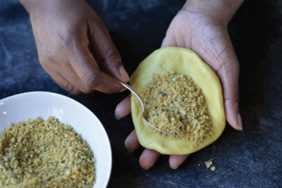
|
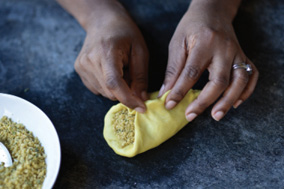
|
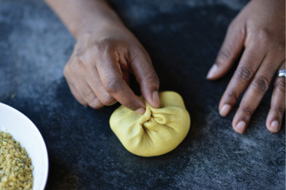
|
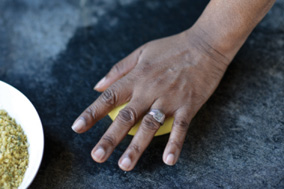
|
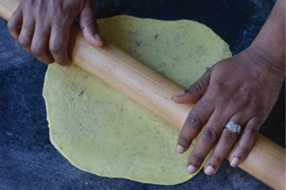
|
To quick-soak the split peas, add enough boiling water to cover by about 2 inches (5 cm) and let them sit for about 20 minutes.
Note that the cooked skins freeze well and can be thawed in a matter of minutes. You can steam them or cook them on a griddle for a few seconds to reheat them.
You may know buss-up-shut by its Indian name: paratha. It is a plain roti that is cooked and then slapped, hit with sticks, or clapped by hand to give it a flaky texture. The term buss-up-shut comes out of Trinidadian dialect and means “busted-up shirt.” The name is fitting, as the process of slapping the roti after cooking gives it the appearance of a shredded shirt. As with Dal Puri Roti, in the final rolling you want to make these about the size of your cooking surface, so a larger griddle or tawa means a thinner roti. Serve these with Yellow Split Pea Dal or any curry you like.
MAKES 6 ROTIS
4 cups (500 g) unbleached all-purpose flour
1 teaspoon baking powder
1 teaspoon light brown sugar
½ teaspoon pink or sea salt
1 tablespoon plus 1½ teaspoons vegetable oil, plus more for coating and cooking
1½ cups (360 ml) water, or more as needed
A good ripe plantain is sweet and flavorful. Plantains sold in the United States usually come from Mexico, though if you are lucky you may find some from the Caribbean in ethnic markets. I am not saying that everything in the Caribbean tastes better, but I find the plantains from this region taste sweeter than the Mexican variety. Caribbean plantains have a bright yellow skin, like bananas, and the skin blackens as they become riper. The Mexican variety has a dark yellow color, and the darkening tends to be in spots, not lines. Everyone fries plantains differently. I tend to cut them lengthwise or sometimes in wedges. Plantains are best fried in a neutral-flavored oil such as canola.
SERVES 4
2 ripe plantains (see Island Tip)
¼ cup (60 ml) canola oil or another neutral-flavored oil
Peel the plantains and cut them into lengthwise slices. Heat the oil in a large skillet over medium heat. When the oil is hot, fry the plantains, turning them a time or two, for about 5 minutes, until golden brown or slightly darker. Drain on paper towels and serve warm.
ISLAND TIP
If you serve these with a spicy dish, it is better to use very sweet, ripe plantains to complement the spicy flavor. In the Caribbean, fried plantains are very popular for breakfast alongside scrambled eggs. Try pairing one or two slices of fried plantain with your tofu scramble.
This is my go-to easy recipe for sautéed spinach. This dish works well with dals or as a filling for the roti in Dal Puri Roti or Buss-Up-Shut Roti.
SERVES 4
¼ cup (60 g) vegan margarine
1 onion, minced
6 ounces (170 g) spinach, finely chopped
½ Scotch bonnet or habanero pepper, minced
2 teaspoons white pepper
½ teaspoon Madras curry powder
½ teaspoon ground cumin
½ teaspoon garam masala
½ cup (120 ml) water
Pink or sea salt
Black pepper
Heat the margarine in a large saucepan over medium heat. Add the onion and spinach and sauté for 4 minutes, until onions are translucent. Add the Scotch bonnet, white pepper, curry powder, cumin, garam masala, and water and cook for about 5 minutes, until the spinach is wilted and most of the water has evaporated. Season with salt and black pepper to taste and serve hot.
This way of serving okra is different from the typical, more moist preparations that you may be accustomed to. This dish can be used as a filling for Dal Puri Roti or Buss-Up-Shut Roti, or as an accompaniment to rice.
SERVES 4
¼ cup (60 ml) olive oil
1 Scotch bonnet or habanero pepper, minced
4 to 6 garlic cloves, minced
50 okra pods, sliced
1 teaspoon ground cumin
Pink or sea salt
Black pepper
Heat the oil in a skillet over medium heat. Add the Scotch bonnet, garlic, and okra and sauté for about 5 minutes, until the okra browns. Stir in the cumin and season with salt and pepper to taste. Turn the heat down to medium-low and sauté for 3 minutes, until the okra is cooked through. Serve warm.
Mashing green bananas in coconut milk results in a very flavorful dish that is almost cheesy—and addictive and filling. This dish is excellent topped with Creole Sauce or Onion Gravy, or served alongside Creole Red Bean Stew.
SERVES 4
10 green bananas
1 cup (240 ml) coconut milk
¼ to ½ onion, grated
1 garlic clove, pressed
1½ teaspoons adobo seasoning
1 teaspoon onion powder
½ teaspoon black pepper
Pink or sea salt
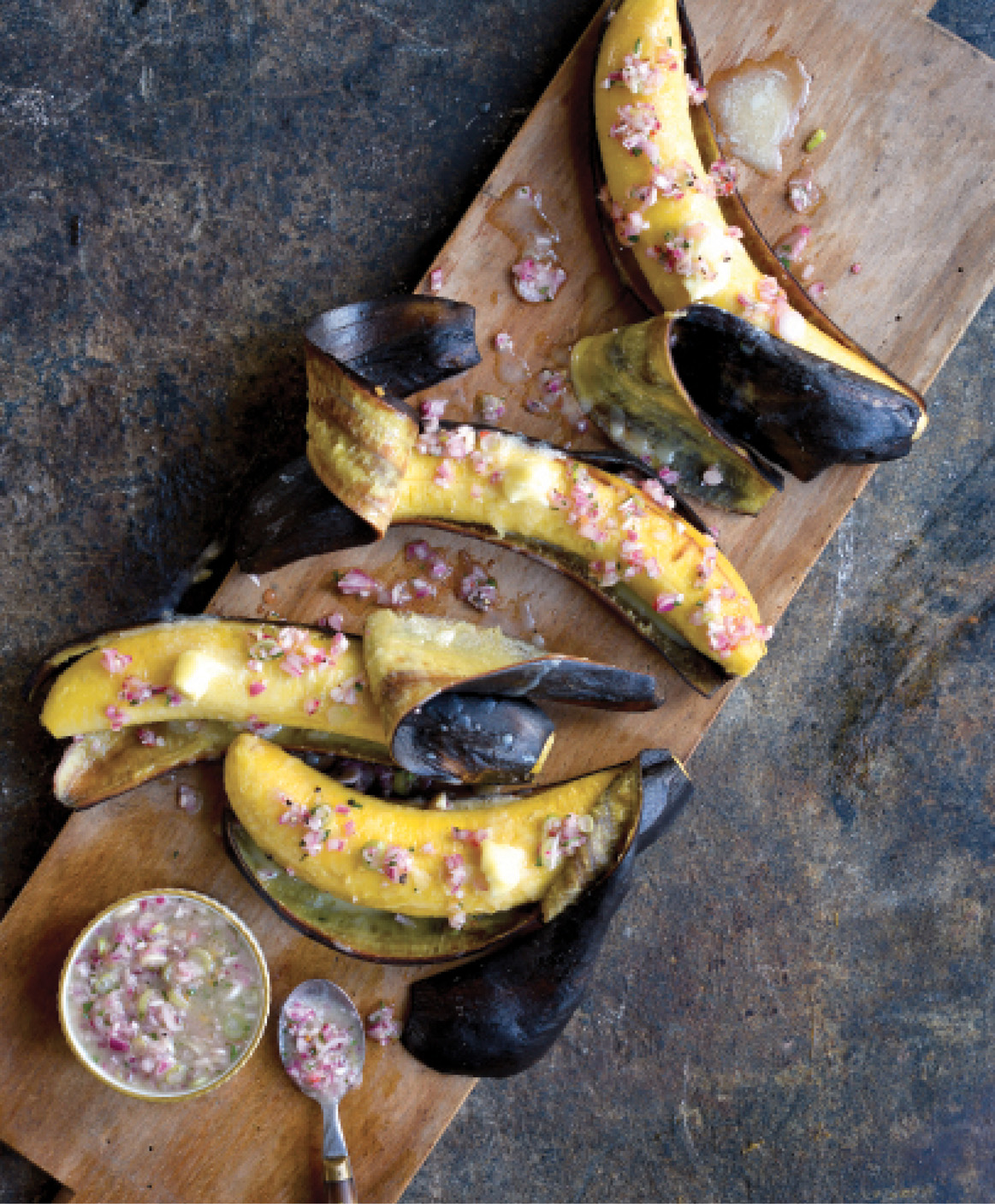
Who said you have to fry plantains all the time? Sweet plantains are also good when boiled in the skin. If you carefully remove the skin after steaming, the plantain will still be intact. Prepared this way, they can be eaten with vegan margarine, Creole Sauce, or Onion Gravy, but I think Sauce Chien is tastiest.
SERVES 4
4 ripe plantains (see Island Tip)
2 teaspoons vegan margarine
1 cup (240 ml) Sauce Chien
ISLAND TIP
If you only have half-ripe plantains, it is better to peel them before steaming.
In the Caribbean, sweet potato chips or fries are usually made with white sweet potatoes. Because of their low moisture content, white sweet potatoes hold their shape well, and because they have a mild flavor, they take on the flavor of the seasoning nicely. For a real taste sensation, dip them in Pineapple Barbecue Sauce. In this recipe, the sweet potatoes are baked, so they’re lower in fat but still delicious. If you like, you can fry the potatoes instead, and then toss them with the spices.
SERVES 4
1 pound, 6 ounces (620 g) white-fleshed sweet potatoes
2 teaspoons onion powder
1 teaspoon pink or sea salt
1 teaspoon Creole seasoning
½ teaspoon cayenne pepper
½ teaspoon black pepper
½ teaspoon dried thyme
½ teaspoon Madras curry powder
½ teaspoon chili powder
⅛ teaspoon ground cinnamon
⅛ teaspoon mild paprika
⅓ cup (80 ml) olive oil
This sweet and spicy curry makes a perfect filling for the roti in Dal Puri Roti or Buss-Up-Shut Roti. If using this curry as a filling for roti (see photo), it should be hot when you are assembling your roti.
SERVES 4 AS A SIDE DISH, OR 6 IF USED AS A ROTI FILLING
2 tablespoons olive oil
2 tablespoons Colombo or Madras curry powder
1½ teaspoons ground cumin
½ teaspoon garam masala
1 onion, chopped
3 cups (720 ml) water
2½ cups (200 g) diced potatoes, cut into 1½-inch (4 cm) cubes
1½ cups (210 g) chopped calabaza, butternut, or other winter squash, cut into 1½-inch (4 cm) cubes
1 teaspoon pink or sea salt, or to taste
1½ teaspoons American-style prepared mustard
1½ teaspoons tomato paste
1 teaspoon black pepper
1 teaspoon mild paprika
1 teaspoon ground turmeric
½ teaspoon Bajan Pepper Sauce, or ⅛ to ¼ teaspoon cayenne pepper
3 or 4 garlic cloves, pressed
Chopped fresh parsley, optional
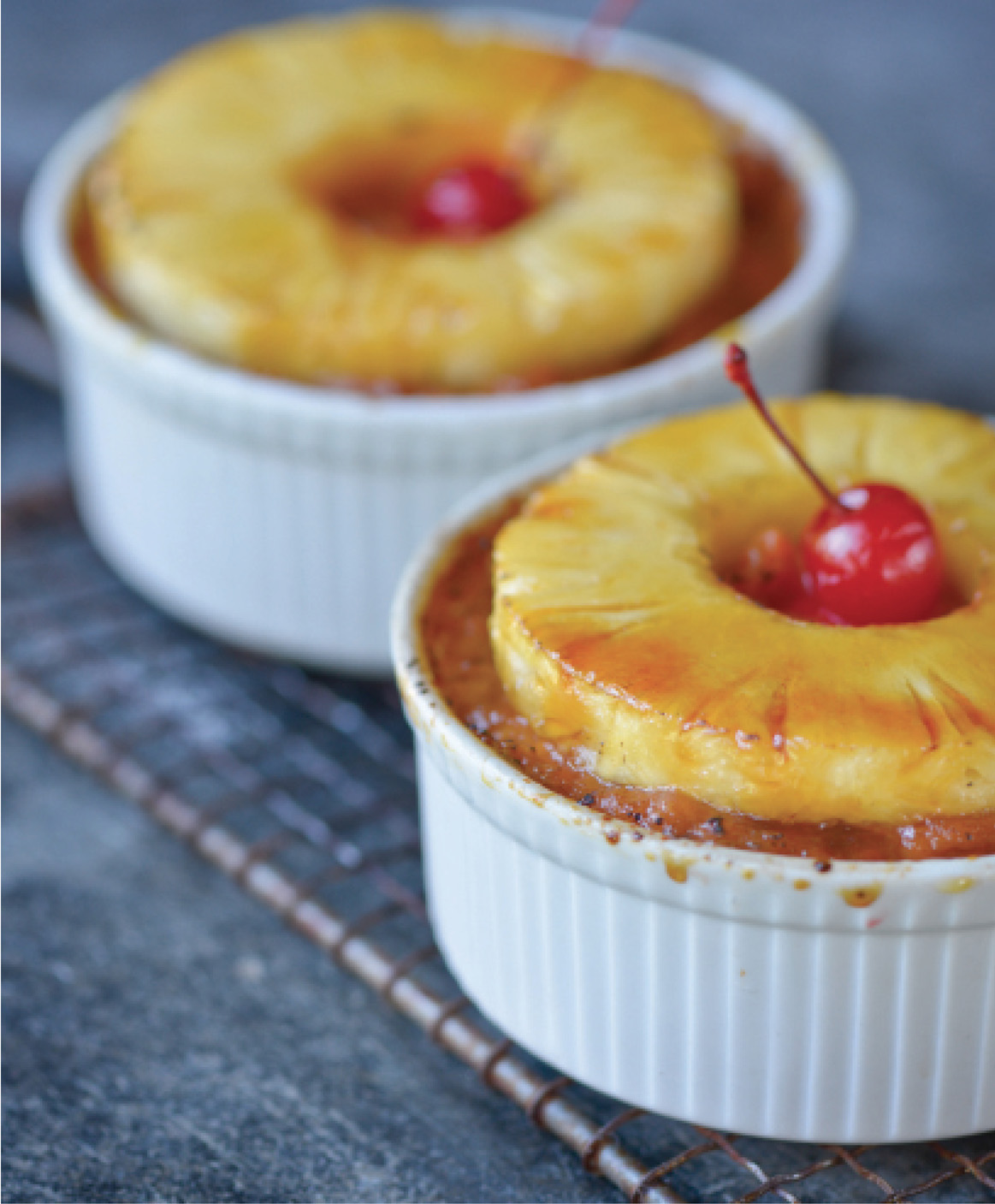
This sweet potato dish is traditionally served on Sundays or on special occasions. The topping is stunning: pineapple slices and cherries—you have to love that. Feel free to double or triple the recipe, but I prefer this pie in small quantities, served with a bit of Onion Gravy. Ordinarily, this pie is baked in a baking pan and then cut into squares for serving, but my version calls for making individual pies.
SERVES 2
1 pound, 6 ounces (620 g) white- or yellow-fleshed sweet potatoes, coarsely chopped
2 tablespoons vegan margarine
½ cup (120 ml) pineapple juice
1 teaspoon ground cinnamon or cassia
Pink or sea salt
2 pineapple slices
2 cherries
2 teaspoons granulated sugar
This creamy, buttery mash of breadfruit is usually served as part of a weekday lunch in Barbados. I suggest serving it topped with Creole Sauce, alongside Tofish.
SERVES 4
½ breadfruit and Island Tip
⅓ cup (75 g) vegan margarine
2 green onions, minced
½ teaspoon pink or sea salt, optional
⅛ teaspoon liquid smoke, optional
ISLAND TIPS
Traditionally, this dish is cooked with a piece of salted pork, which is why I included liquid smoke in my version. You can leave it out if you prefer.
You can also make this dish using a 19-ounce (540 g) can of breadfruit. Just gently reheat the canned breadfruit to soften it before mashing. Because canned breadfruit is packed in brine, there’s no need to include the salt called for in the recipe.
This is a popular way of preparing root vegetables in Guyana. The vegetables are first boiled or steamed, and then sautéed with herbs and other aromatic ingredients. For a nice meal, pair it with Eggplant, Hearts of Palm, and Spinach Stew and a slab of Tofish.
SERVES 4
11 ounces (310 g) yam, cassava, or breadfruit, diced into 1½-inch (4 cm) cubes
1 green or half-ripe plantain
3 tablespoons olive oil or canola oil
½ onion, chopped
¾ cup (150 g) coarsely chopped tomato
¼ cup (15 g) minced mixed herbs (such as parsley, basil, thyme, or marjoram), green onions, or a combination
2 garlic cloves, minced
2 mild chile peppers, such as Hungarian wax peppers, minced, optional
Pink or sea salt and black pepper
This is just what the name says: a slush of okra. As a side dish, it’s best with rice and a curry. It can also be served as a soup, in which case you could blend it if you like.
SERVES 4
4¼ cups (1 L) water
40 to 50 fresh okra pods, sliced into ½-inch (1.3 cm) rounds
1 onion, finely chopped
3 garlic cloves, pressed
1 tomato, chopped
1 small Scotch bonnet or habanero pepper
A few chunks of Holiday “Ham”, optional
1 heaping tablespoon Trinidadian Green Seasoning
1½ teaspoons pink or sea salt
¼ teaspoon celery salt
¼ teaspoon dried thyme
Lime wedges
In this side dish, okra is cooked in a sofrito-type sauce, characterized by onion, garlic, bell pepper, and tomato. This dish makes a nice accompaniment to a veggie burger, or serve it with hot white rice.
SERVES 4
2 tablespoons olive oil
24 okra pods, sliced ¼- to ½-inch (6 to 13 mm) thick (see Island Tips)
1 onion, chopped
4 garlic cloves, minced
5 tomatoes, chopped
½ cup (100 g) chopped Holiday “Ham” or smoky vegan sausage
¼ cup (40 g) chopped green bell pepper or mild green chile peppers
¼ Scotch bonnet or habanero pepper, seeded and minced
½ teaspoon liquid smoke
1 cup (240 ml) water
Two 8-ounce (227 g) cans regular tomato sauce, preferably Spanish-style (see Island Tips)
2 tablespoons Bragg Liquid Aminos or soy sauce
2 tablespoons chopped fresh parsley
2 teaspoons chopped fresh thyme, or ¼ teaspoon dried
1 teaspoon pink or sea salt, or to taste
½ teaspoon white pepper
Heat the oil in a saucepan over medium heat. Add the okra and sauté for 3 minutes, until lightly browned. Remove half of the okra and set aside. Add the onion, garlic, tomatoes, Holiday “Ham,” bell pepper, Scotch bonnet, and liquid smoke. Sauté for 2 minutes, then turn down the heat to low and sauté for 2 more minutes. Stir in the water, tomato sauce, liquid aminos, parsley, thyme, salt, white pepper, and the remaining okra. Cook for 10 minutes. Taste and adjust the salt if necessary. Serve hot.
ISLAND TIPS
When selecting okra, make sure it’s firm, but you don’t want it too hard, or it will be tough and fibrous. Okra doesn’t have a long shelf life, so use it as soon as possible after purchase. Slicing the okra somewhat thick, as in this recipe, guarantees that it will still have some crunch once it’s cooked.
For this recipe to really pop, it’s best to use a Spanish-style tomato sauce. Goya is the brand I tend to use. Spanish-style tomato sauce is slightly more acidic than regular tomato sauce, and also contains different spices.
This recipe is influenced by Grenada’s national dish, the oil down, which is root vegetables cooked in seasoned coconut milk with salted pork or meat until most of the coconut milk is absorbed in the vegetables, leaving a liquid that is mostly coconut oil. Oil down is a community food that is enjoyed with friends and family members and sometimes made outdoors. The vegetable of choice is cassava, but you can also use breadfruit. Traditional oil down is not vegan, as the dish is started off with salted pork, but you can approximate the flavor with some liquid smoke or a few pieces of Holiday “Ham.”
SERVES 4
1 tablespoon vegan margarine
½ onion, thinly sliced
3 garlic cloves, minced
1 celery stalk, including leaves, chopped
½ cup (100 g) Holiday “Ham,” chopped, optional
1 tablespoon chopped mild chile peppers, such as Hungarian wax peppers
2 teaspoons chopped fresh thyme, or ½ teaspoon dried
12 ounces (340 g) cassava or breadfruit, diced into 2-inch (5 cm) cubes
2 cups (480 ml) coconut milk (see Island Tips)
2 cups (60 g) shredded spinach
1 teaspoon pink or sea salt
½ teaspoon ground allspice
½ teaspoon ground turmeric
Melt the margarine in a large saucepan over medium-low heat. Add the onion, garlic, celery, optional Holiday “Ham,” mild chiles, and thyme and sauté for 4 minutes, or until the vegetables are tender and ham starts to brown a little. Stir in the cassava, coconut milk, spinach, salt, allspice, and turmeric. Cover partway and cook for 50 minutes, or until the cassava is tender and the oil has settled out. Pour the oil off if you like. Serve hot.
ISLAND TIPS
For a version that is lower in fat, you can use 1 cup (240 ml) of regular coconut milk and 1 cup (240 ml) of light.
This makes a nice accompaniment to Bajan “Beef” Stew.
This dish is a mixture of vegetables seasoned and cooked mildly. I chose green banana for this recipe because it holds its shape well after cooking. If you can’t find green bananas, you can substitute white or yellow sweet potatoes.
SERVES 4
5 green bananas
1 teaspoon pink or sea salt
1 butternut or other winter squash, cut into short, thin crescents
½ zucchini, coarsely chopped
1 tablespoon olive oil
1 onion, coarsely chopped
1 garlic clove, minced
1 large green bell pepper, coarsely chopped
4 green onions, chopped, or 1 tablespoon Trinidadian Green Seasoning
½ cup (120 ml) water
1 large tomato, coarsely chopped
½ Scotch bonnet or habanero pepper, minced, or ¼ teaspoon hot pepper flakes
1 tablespoon finely chopped fresh parsley
1 tablespoon Bragg Liquid Aminos or soy sauce
1 teaspoon black pepper
1 teaspoon ground cumin